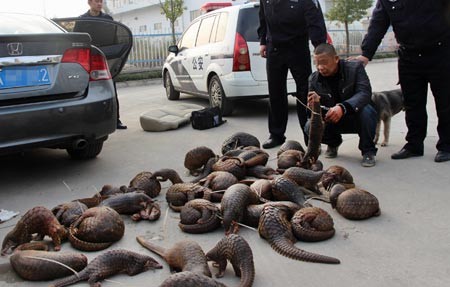Police in China’s Yongjia County in eastern China’s Zhejiang Province have uncovered an extensive smuggling ring involved in the illegal distribution of live rare animals to more than 10 provinces in China.
According to authorities, the illegally smuggled wildlife were purchased from dealers in Guangdong and Guangxi and delivered directly to buyers' restaurants.
The smuggling ring is alleged to have already distributed over 100 million yuan ($15.7 million) worth of rare wildlife, comprising of leopard cats, turtle doves, giant salamanders and frozen animal limbs, among others.
The animals are tranquilized prior to the delivery to prevent detection. Once they are in the hands of clients, they are injected with stimulants and subsequently forced to take in calcareous water to gain weight. After slaughtering and freezing, the meat would be bleached with hydrogen peroxide to improve appearance.
A large number of endangered species are smuggled into mainland China from Jiancheng County in Pu'er City, bordering Vietnam and Laos, and the illegal activity remains to be a lucrative business for smugglers and restaurant owners.
Pangolin meat can cost up to 1,400-1,600 yuan ($220-$250) per kilo, while a bear's paw can be sold for 1,600 yuan ($250) per kilo. Restaurant owners can gain a large profit from buying macaque meat for 400 yuan ($63) and then serving it to customers for 1,000 yuan ($157).
In the Huangsha seafood market located in Guangzhou City, people can avail wild game offerings which include Vietnamese crocodiles. It is estimated that in a year, 100,000 crocodiles are consumed in Guangdong, where the locals are famous for their adventurous appetites.
"When you see crocs that are suffering from injuries to rostrums and limbs, they are mostly sourced from illegal channels," said an insider.



























